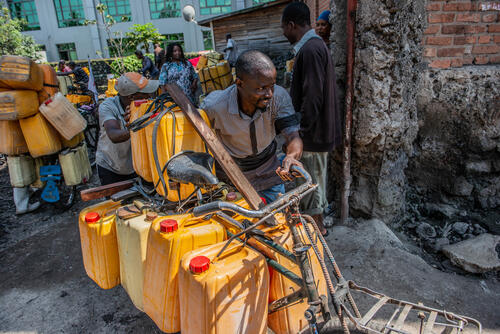Depuis l'éruption du Nyiragongo à Goma, la demande en eau potable est en hausse considérable en raison des dommages causés au principal réservoir d’eau de la ville. « Nous travaillons dur. Notre structure permet en cette période particulière d’approvisionner la population en eau potable pour lutter contre le choléra et d’autres maladies d’origine hydrique », précise Jean-Claude.
« Depuis le 22 mai dernier, l’eau est devenue une denrée rare. Il n’est pas question de laisser les familles sans eau : j’ai sept enfants, je comprends leur difficulté. En retour, elles me payent pour subvenir aux besoins de ma famille. Je ne peux pas profiter de la situation de crise que nous subissons actuellement pour faire de l’argent et doubler le prix de mes services. Le tarif n’a pas changé : 250 Francs congolais (0,10 euros) pour un jerrican de 20 litres d’eau.
Pour éviter de faire souffrir davantage la population ou la rendre malade, nous ne vendons pas l’eau du lac mais celle du robinet.
Nous vivons encore avec les traumatismes de cette nuit du 22 mai. Quand la nuit est devenue rouge, nous nous sommes précipités hors de la maison pour fuir le danger. Deux de mes enfants ont été blessés et ils souffrent encore. Ils se sont mis à l’abri à Minova, dans le Sud-Kivu. Ils sont de retour à Goma et c’est désormais la faim qui les tenaille. »

Trois semaines après l’éruption du volcan Nyiragongo qui a eu lieu dans la nuit du 22 au 23 mai, 200 000 personnes encore déplacées dans les provinces du Nord et Sud Kivu, mais également au Rwanda voisin, reviennent progressivement à Goma, appuyées par les services du gouvernement provincial. Ils seraient 20 000 à avoir tout perdu quand la coulée de lave s’est dirigée vers Goma, détruisant 17 villages, des centres de santé et des écoles, sur son chemin.
